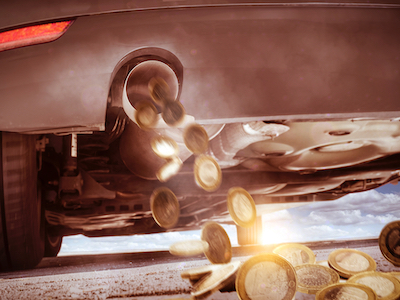The Main Causes of Bad Gas Mileage (And What To Do About It)
Nothing is more irritating than a vehicle that starts to get bad gas mileage. Instinctively, you know it means your car or truck isn't running at peak efficiency. It also means you're losing money!
But what causes the problem in the first place? Bad gas mileage actually has numerous causes. Here are the top offenders and what you should do about it.
Incorrect Tire Pressure
This is very common and it's also the easiest to correct. Just check your tires periodically to make sure you have the recommended pressure levels. Usually, the manufacturer's recommendation is stamped on the driver's side doorplate. It is NOT the "maximum pressure" number that's listed on the actual tire.
Spark Plugs
If spark plugs are misfiring or performing poorly, your gas mileage will be affected. Spark plugs are responsible for sparking engine combustion. They can't do that if they aren't working efficiently.
Bad Oxygen Sensors and/or Air Filters
Bad oxygen sensors and air filters can reduce gas mileage by as much as 20%! It's a must to help keep oxygen sensors with a proper mix of air and fuel so they can perform optimally. Dirty air filters, clogged with sand and debris, simply need to be replaced so that the engine can perform at its peak.
Driving Habits
It's true. If you're an aggressive driver, you'll use more fuel than you need to. And while it sounds super cool to rev your engine, you're wasting gas going nowhere.
Bad Fuel Injectors
Fuel injectors are responsible for injecting fuel into the engine. Should there be a leak then less fuel gets to the engine causing poor gas mileage.
Air Conditioner
Air conditioning is necessary when it's really hot. Just remember, that it also decreases gas mileage. When possible, open your windows.
Motor Oil
The type of motor oil you use can affect your gas mileage by as much as 12%. Use car oils that are high in friction reduction. Choose either a synthetic or what your owner's manual recommends.
Idling
In the winter, you don't really need to let your car idle to warm it up. All it really needs is 30 seconds. Still, because it's cold, you may want to warm up the vehicle for you! Getting into a warm vehicle is always preferable to getting into a cold one.
However, when you're waiting for someone, either turn off your car or put it in neutral. This will save gas and help the environment!
When you need help getting your car or truck to run efficiently, turn to the service pros at Joe Bowman Auto Plaza! Check out our website to learn more about us.


